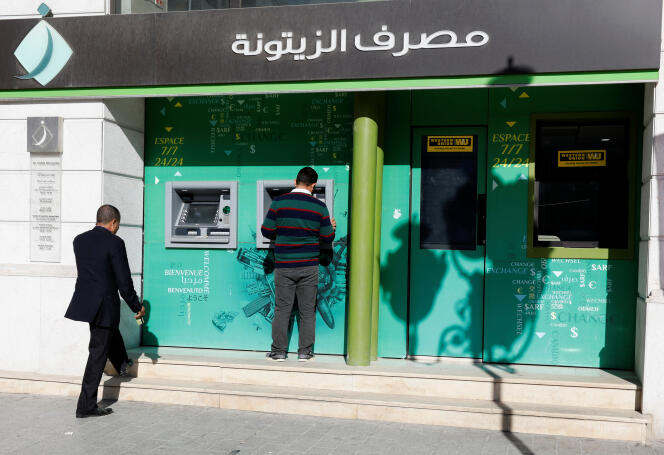In Tunisia, the government plans to decriminalize bad checks


Olfa has been living at home for almost four years. Sentenced in absentia to thirty-five years in prison for a bad check, this 45-year-old mother, divorced and originally from the southern suburbs of Tunis, Rades, is still wanted by the authorities. “If I didn’t have faith, I would kill myself”Trusts this former business leader, who went bankrupt after the Covid-19 crisis and is waiting for only one thing: the reform of the legislation – especially strict in Tunisia – on bad checks, as promised by President Kais Said in March 2023.
Today, Section 411 of the Commercial Code provides for 5 years in prison for each bounced check – the penalties are cumulative – and a fine of 40% of the amount of those checks. This law was considered disproportionate “Does not allow the creditor to recover the fees, nor the convict to adjust his situation, because he is behind bars.”, said the Tunisian president. Official figures released at the end of 2022 show an alarming situation: more than 7,000 people are believed to be in custody for issuing bad checks – a third of the prison population – and more than 450,000 people are wanted.
If the Ministry of Justice estimated these figures, which counted less than 500 prisoners and 10,000 ongoing cases in November 2023, the Central Bank of Tunisia recorded more than 400,000 rejected checks, totaling 3.5 billion dinars (about 1 billion euros). 2023 alone. “There is an accounting problem in the ministry”Critic Abderazak Huas, representative of the National Association of Small and Medium Enterprises (ANPME).
“I feel like I’m in prison”
Friday April 12, the bill aims to “Decriminalization of certain offenses related to bad checks and reduction of certain sanctions, especially those resulting in imprisonment,” submitted by the Minister of Justice to the Council of Ministers, as stated by the Chairman of the Government, where it is not specified in what cases the sentence can be reduced or canceled.
The draft still needs to be modified before it is finally approved by the government and then sent to parliament – but the deadline is not known. At the same time, 84 MPs called for an urgent review of a bill introduced in February that aims to declare a general amnesty for people who have issued bad checks.
For the hundreds of thousands of Tunisians who use checks as a means of deferred payment or guarantee, the trap may suddenly close. In 2017, Olfa opened a small textile factory for export in La Goulet, on the outskirts of Tunis, employing around fifty workers and working for European ready-to-wear brands.
For his equipment, he had to go to a supplier who accepted installments by check, a common practice among entrepreneurs facing reluctance to extend credit from banks. “They are forced to do this with their suppliers or through intermediaries who act as parallel banks. They are real mafias”Confirmed by Abderrazak Huas.
Despite some difficulties, the business is booming and Olfa is able to meet its financial obligations without much difficulty. But 2020 is a turning point: the spread of Covid-19 and the announcement of a general lockdown on March 22 forced it to suspend its activities. The following month, his supplier cashed several checks that were rejected by the bank, despite a government order calling for leniency from financial institutions. “He cashed the checks early, despite the agreement we reached, simply because he was afraid.”Olfa regrets.
In a few months, the mother was in trouble. He was finally sentenced in 2021. “I am in prison. I could not even attend the graduation of my daughter, who was also very psychologically affected.”He confides.
“I’ll Never Go Back”
Between 2019 and 2021, according to the National Institute of Statistics, 75,000 companies went out of business, or almost 10% of registered companies. For Abderazak Huas, this figure, although significant, does not reflect reality “catastrophic” About the economic situation of small and medium businesses in Tunisia. An ANPME spokesperson estimates that 125,000 additional companies have gone out of business since the Covid-19 crisis.
2,000 km away, in Rabat (Morocco), Haitham suffered the same fate as Olfa. “There’s a cafe here that’s always full of Tunisians called Chek Cafe”, he jokes. After more than ten years of using financial networks in the parallel market, he saw his activity collapse in 2020 during the Covid-19 crisis. “These people are saving no one, all checks are cashed.” » Bankrupt and over-indebted, he was arrested in December 2021 at his home. Released four months later to await trial, he decided to flee to Morocco before being sentenced to eighty-three years in prison.
According to ANPME, more than 10,000 Tunisians persecuted for issuing bad checks, like Haitham, have left the country. Married and the father of three children, this displaced entrepreneur now lives alone with the support of friends and acquaintances. With his brother and parents imprisoned in Tunisia, he hopes for an amnesty for his family and, in turn, will be able to work somewhere other than Tunisia. “I’ll never go back there she said. This country ruined me. »
Source: Le Monde
Leave a Reply